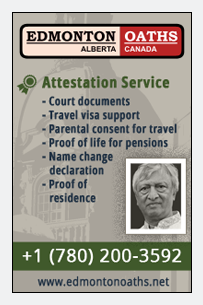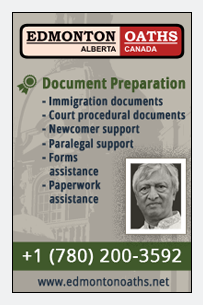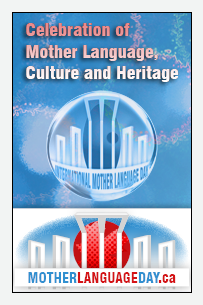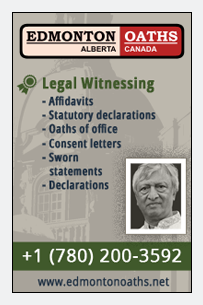You've probably heard of notaries and lawyers — but what about Commissioners for Oaths? We spoke with Alberta Commissioner Delwar Jahid to uncover the nuances of his profession, the challenges he faces, and how his duties differ from other legal officials.
Presented in a question and answer format, this article features questions directed at the Commissioner for Oaths, with focused responses that illuminate the profession's scope and distinctions from other legal roles.
Can you briefly explain what a Commissioner for Oaths does in Alberta?
A Commissioner for Oaths in Alberta is authorized to administer oaths, affirmations, and statutory declarations. Essentially, witness the signing of legal documents, confirm the identity of the person signing, and ensure they are doing so voluntarily and truthfully under oath or affirmation. It's an important function that helps maintain the integrity of legal and official documents.
What inspired you to become a Commissioner for Oaths?
As someone deeply involved in community services and advocacy work, I saw a need for accessible, trustworthy, and affordable commissioning services — especially for newcomers, seniors, and those in vulnerable situations. My goal was to bridge a service gap in Edmonton and surrounding areas by making the process easier and more compassionate.
What kind of training or certification is required for someone to become one in Alberta?
In Alberta, individuals must apply through the Ministry of Justice and Solicitor General. While formal legal training isn't required, applicants must demonstrate good character and understanding of the legal responsibilities. Once approved, a commissioner receives an appointment for their term.
What other trades did you learn that complement your work as Commissioner for Oaths?
In addition to being a commissioner, I have experience in public administration, journalism, and immigration paperwork support in Germany while I was doing my higher academic research at the University of Education Freiburg and I was manager (PR) for a reputed Law Firm attached to Professor Dr. Hager of Freiburg University. These skills help me understand the broader legal context, communicate clearly, and guide clients in navigating complex documentation — always within the legal limits of my authority.
What types of documents do Commissioners for Oaths typically deal with?
We handle a wide range of documents such as statutory declarations, affidavits, letters of consent, immigration sponsorship forms, marital status declarations, and travel authorizations for minors. We do not notarize documents or certify copies unless also appointed as a notary.
Are there ever disputes or legal issues that arise after you’ve administered an oath?
No, but if they do, the content of the sworn statement is the client's legal responsibility. My role is limited to witnessing and administering the oath. If I ever suspect fraud, I can decline service and recommend legal counsel.
Are there any specific situations or types of documents that you are NOT authorized to handle?
Yes. I cannot notarize documents, witness land title transfers, certify true copies, or perform any duties reserved for lawyers or notaries public. I also cannot give legal advice or act outside Alberta’s jurisdiction.
What are the key differences between a Commissioner for Oaths and a Notary Public in Alberta?
Commissioners can only administer oaths and declarations within Alberta. Notaries have broader authority—they can notarize international documents, certify true copies, and operate outside Alberta.
In what scenarios would someone choose a Commissioner over a Notary or lawyer?
If a person simply needs to swear a document or sign a statutory declaration for use within Alberta, a Commissioner is sufficient and more affordable. For real estate, power of attorney, or cross-border documentation, they should see a notary or lawyer.
How does the cost and accessibility of your services compare?
My services are reasonably priced and often more accessible than those of a law firm. I offer flexible hours and mobile services, which make it easier for working families, immigrants, or seniors to get documents commissioned quickly.
How does your role differ from that of a lawyer, especially in document verification and legal advising?
Lawyers can do all that — and represent clients in court. I strictly adhere to my mandate: to witness and administer oaths, ensuring clients understand what they are signing.
What level of legal responsibility do you hold compared to a Notary Public or lawyer?
My responsibility is to ensure proper identification and voluntary declarations. I am not liable for the truth of the content or legal consequences of the document unless I acted negligently or fraudulently.
Are there instances where all three — Commissioner, Notary, and lawyer — might be involved in processing the same document?
Yes. For example, in complex immigration or legal cases, a lawyer might prepare a document, a notary might certify a copy, and a Commissioner might administer the final declaration in Alberta.
Are Commissioners for Oaths allowed to offer legal advice?
No, we are strictly prohibited from offering legal advice. If clients need interpretation or legal direction, they must speak to a qualified lawyer.
Are there specific types of documents or declarations that you are explicitly prohibited from handling?
Yes, we cannot witness wills, real estate transfers, powers of attorney, or any document requiring a notary or lawyer. We also cannot witness documents intended for use outside Alberta unless we're dual-appointed.
Are there any geographic limitations to where you can perform your duties?
Yes. I can only perform my duties within the Province of Alberta. I cannot commission documents if I or the client are located outside the province, even virtually.
What happens if someone requests your services for a document that falls outside your legal authority?
I politely decline and inform them why. Then I refer them to a notary public or lawyer who is authorized to assist with their specific need.
What are the legal implications of having a document sworn or affirmed by a Commissioner for Oaths?
A sworn or affirmed document carries legal weight, just like a testimony under oath. If the content is later found to be false, the individual can face perjury or fraud charges.
What happens if someone swears a false statement? Are you responsible for verifying the truth of what they're declaring?
No. The responsibility for the truth of a sworn statement lies with the person making it. However, if I knowingly witness a fraudulent statement, I could face disciplinary action.
If someone needs your services, how do they find you and know you're licensed?
I operate under the name EdmontonOaths Alberta Commissioner of Oaths Services, and I am listed in Alberta's public registry. Clients can find me online at www.edmontonoaths.net or verify my credentials with the Alberta Ministry of Justice.
Our conversation with Delwar Jahid clarified that a Commissioner for Oaths isn't a notary or lawyer — but something distinct. This distinct work lies at a specific intersection of legal access, public service, and procedural formality.
Related Information











